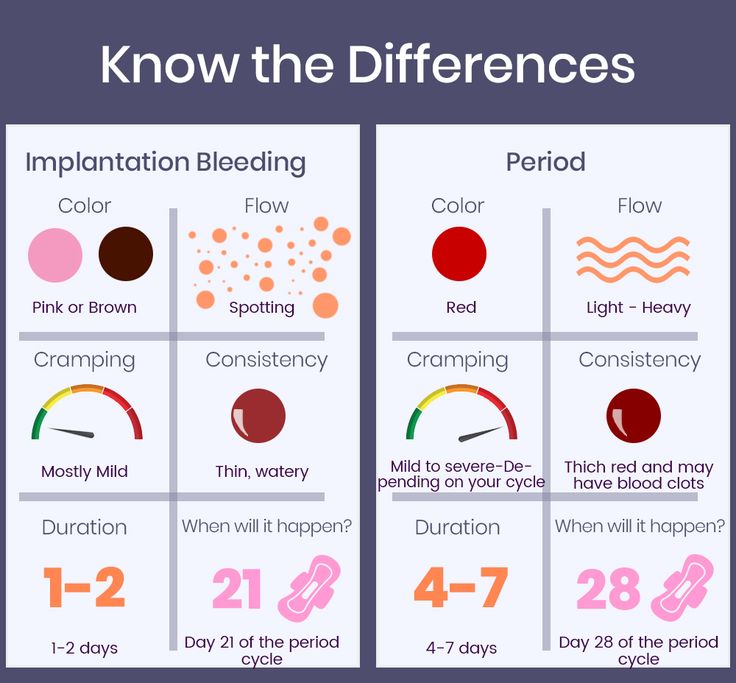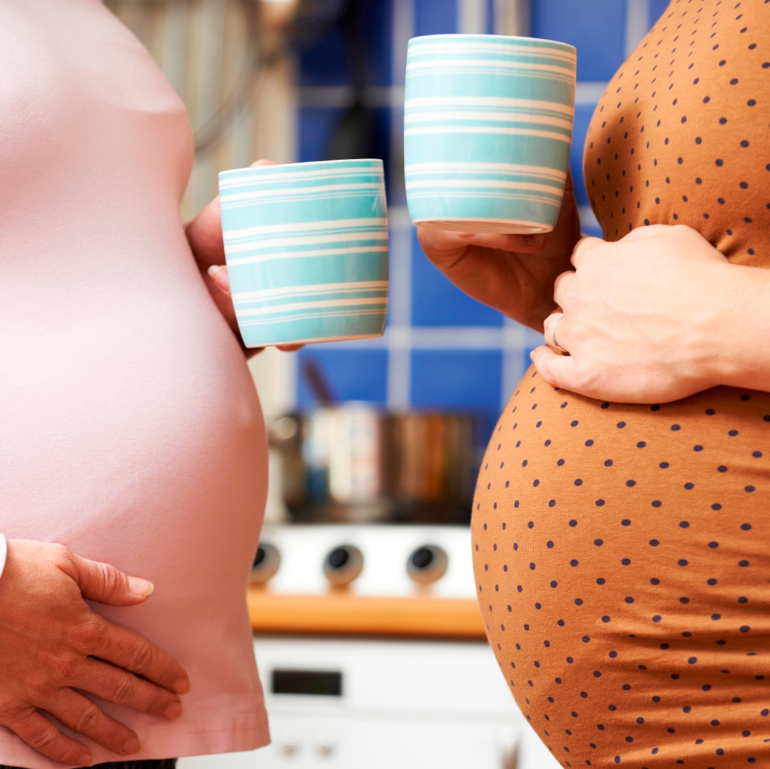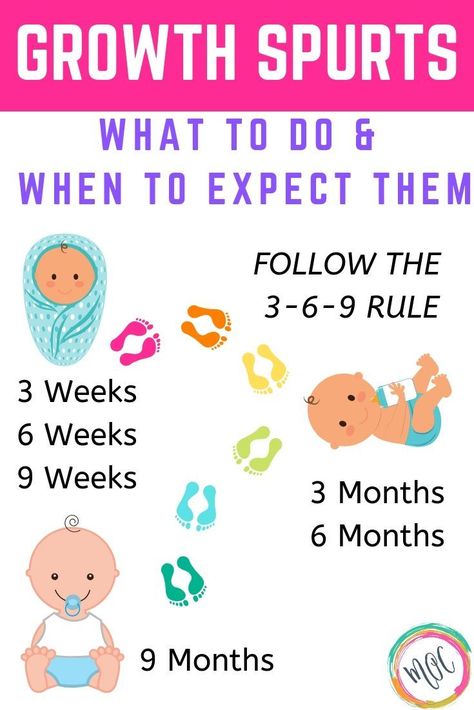Bleeding spotting during pregnancy
Bleeding and spotting from the vagina during pregnancy
Bleeding and spotting from the vagina during pregnancy are common
If you bleed or spot during pregnancy, it doesn’t always mean there’s a problem but in some cases they may be signs of a problem for you or your baby’s health
If you have heavy bleeding, call your health care provider right away
Tell your provider about any bleeding or spotting you have during pregnancy
Bleeding and spotting from the vagina during pregnancy are common. Up to 1 out of 4 (up to 25%) of all pregnant women have some bleeding or spotting during their pregnancy.
Bleeding and spotting in pregnancy don’t always mean there’s a problem, but they can be a sign of miscarriage or other serious complications. Miscarriage is when a baby dies in the womb before 20 weeks of pregnancy.
Call your health care provider if you have any bleeding or spotting, even if it stops. It may not be caused by anything serious, but your provider needs to find out what’s causing it.
What’s the difference between bleeding and spotting?
Bleeding or spotting can happen anytime, from the time you get pregnant to right before you give birth. Spotting is light bleeding. It happens when you have a few drops of blood on your underwear. Spotting is so light that the blood wouldn’t cover a panty liner. Bleeding is when the blood flow is heavier, enough that you need a panty liner or pad to keep the blood from soaking your underwear and clothes.
What should you do if you have bleeding or spotting during pregnancy?
Call your health care provider if you have any kind of bleeding during pregnancy and do these things:
- Keep track of how heavy your bleeding is, if it gets heavier or lighter, and how many pads you are using.
- Check the color of the blood. Your provider may want to know. It can be different colors, like brown, dark or bright red.
- Don’t use a tampon, douche or have sex when you’re bleeding.

Call your health care provider right away at any time during pregnancy or go to the emergency room if you have:
- Heavy bleeding
- Bleeding with pain or cramping
- Dizziness and bleeding
- Pain in your belly or pelvis
What causes bleeding or spotting early in pregnancy?
It’s normal to have some spotting or bleeding early in pregnancy. Bleeding or spotting in the first trimester may not be a problem. It can be caused by:
- Having sex
- An infection
- Implantation. When a fertilized egg (embryo) attaches to the lining of the uterus (womb) and begins to grow.
- Hormone changes. Hormones are chemicals made by the body.
- Changes in your cervix. The cervix is opening to the uterus that sits at the top of the vagina.
- Certain types of testing during pregnancy like an amniocentesis or Chorionic villus sampling (CVS). These are tests that are done to check for genetic abnormalities in your baby.
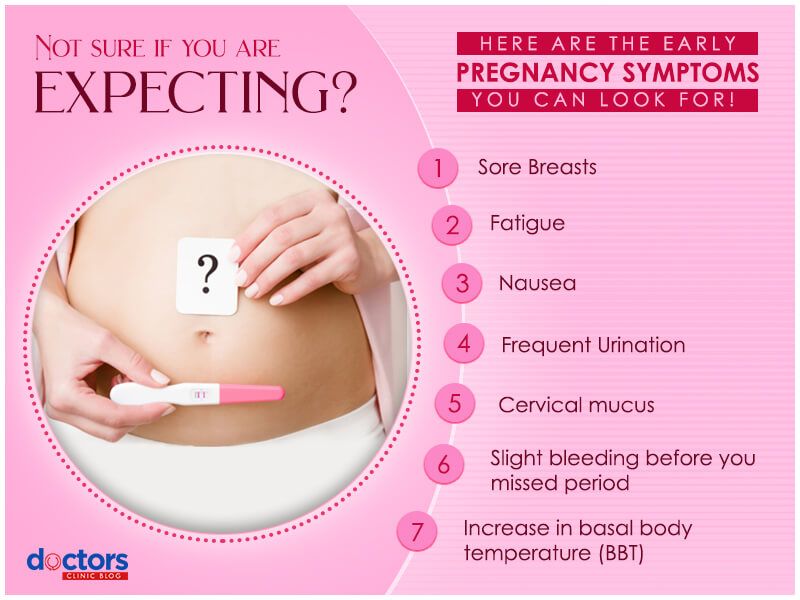 Genetic abnormalities are changes in the genes that are passed down to a baby from mom or dad. These genetic changes can cause health problems for a baby.
Genetic abnormalities are changes in the genes that are passed down to a baby from mom or dad. These genetic changes can cause health problems for a baby. - Problems related to smoking. If you smoke, it’s best to stop before pregnancy or as soon as you know you’re pregnant.
Sometimes bleeding or spotting in the first trimester is a sign of a serious problem, like:
- Miscarriage. Almost all women who miscarry have bleeding or spotting before the miscarriage.
- Ectopic pregnancy. This is when a fertilized egg implants itself outside of the uterus and begins to grow. An ectopic pregnancy cannot result in the birth of a baby. It can cause serious, dangerous problems for the pregnant woman.
- Molar pregnancy. This is when a mass of tissue forms inside the womb, instead of a baby. Molar pregnancy is rare.
What causes bleeding or spotting later in pregnancy?
Bleeding or spotting later in pregnancy may be caused by:
- Labor
- Having sex
- An internal exam by your health care provider
- Problems with the cervix, like an infection, growths, inflammation or cervical insufficiency.
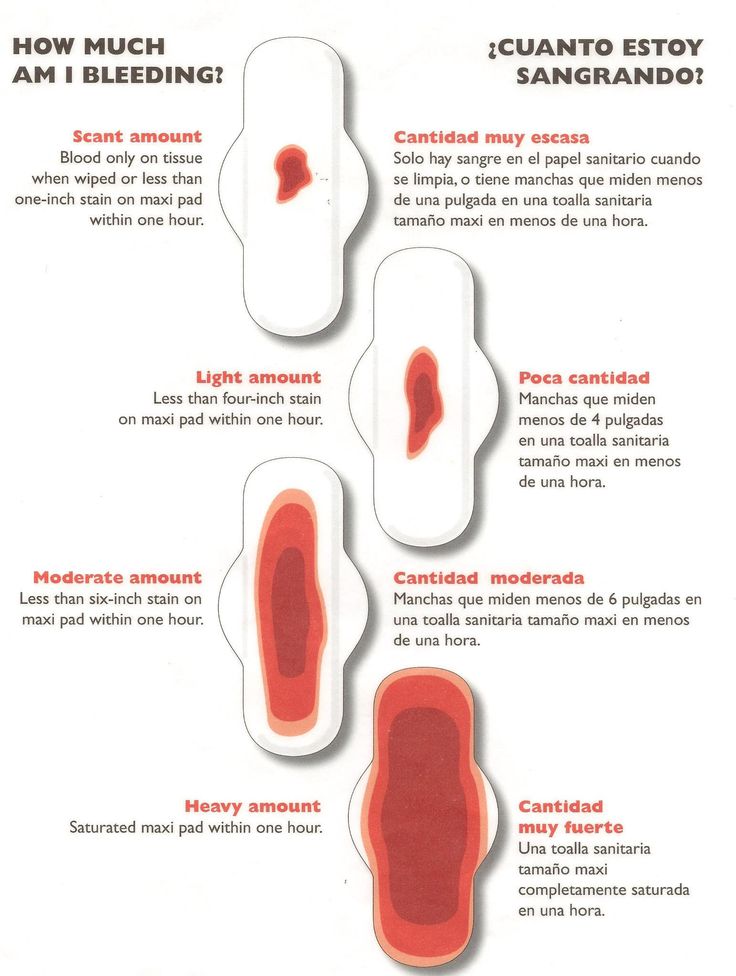 This is when a woman’s cervix opens too early. Inflammation of the cervix is when it may be painful, swollen, red or irritated.
This is when a woman’s cervix opens too early. Inflammation of the cervix is when it may be painful, swollen, red or irritated.
Bleeding or spotting later in pregnancy may be a sign of a serious problem, like:
- Preterm labor. This is labor that happens too early, before 37 weeks of pregnancy.
- Placenta previa. This is when the placenta lies very low in the uterus and covers all or part of the cervix.
- Placenta accreta. This is when the placenta grows into the wall of the uterus too deeply.
- Placental abruption. This is when the placenta separates from the wall of the uterus before birth.
- Uterine rupture. This is when the uterus tears during labor. This happens very rarely. It can happen if you have a scar in the uterus from a prior cesarean birth (also called c-section) or another kind of surgery on the uterus.
 A c-section is surgery in which your baby is born through a cut that your doctor makes in your belly and uterus.
A c-section is surgery in which your baby is born through a cut that your doctor makes in your belly and uterus.
How are bleeding and spotting treated?
Your treatment depends on what caused your bleeding. You may need a medical exam and tests.
Most of the time, treatment for bleeding or spotting is rest. Your provider may also suggest treatments like:
- Take time off from work and stay off your feet for a little while
- You may need medicine to help protect your baby from Rh disease. Rh disease is when your blood and baby’s blood are incompatible (can’t be together). This disease can cause serious problems — even death — for your baby.
- Don’t have sex, douche or use tampons
- If you have heavy bleeding, you may need a hospital stay or surgery
Last reviewed April 2020
Vaginal bleeding - NHS
Bleeding during pregnancy is relatively common and does not always mean there's a problem – but it can be a dangerous sign.
Urgent advice: Call your midwife or GP immediately if:
- you have any bleeding from your vagina
Causes of bleeding in early pregnancy
Implantation bleeding
In early pregnancy, you might get some harmless light bleeding, called "spotting". This is when the developing embryo plants itself in the wall of your womb. This type of bleeding often happens around the time your period would have been due.
Cervical changes
Pregnancy can cause changes to the cervix, and this may sometimes cause bleeding – after sex, for example.
Miscarriage or ectopic pregnancy
During the first 12 weeks of pregnancy, vaginal bleeding can be a sign of miscarriage or ectopic pregnancy.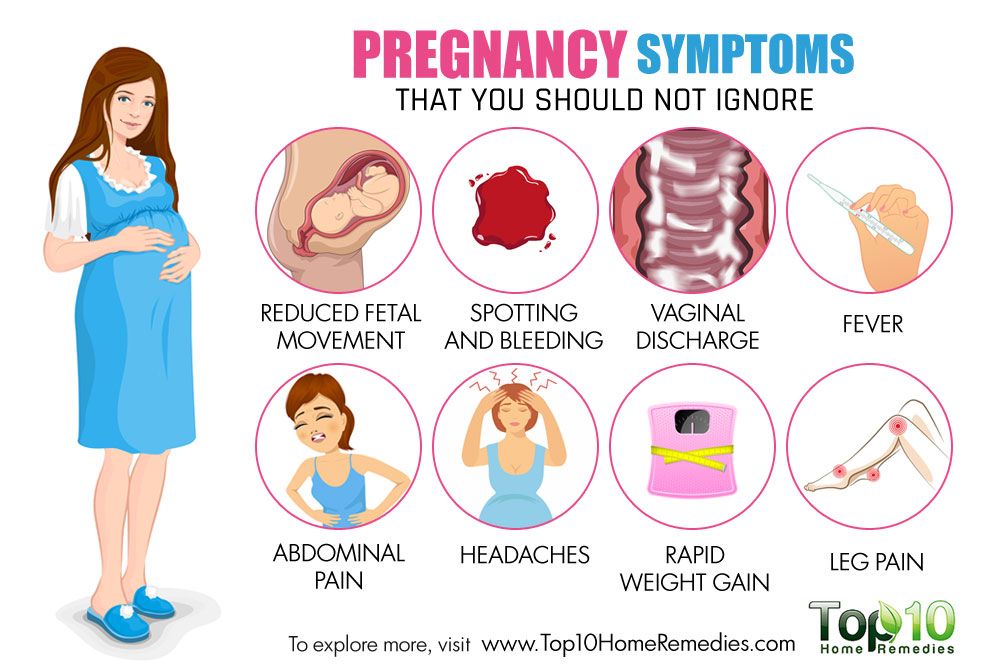
However, if you bleed at this stage of pregnancy it's likely you will go on to have normal and successful pregnancies.
Treating bleeding in early pregnancy
You may be offered a medicine called progesterone to stop bleeding in early pregnancy. This will only be recommended if you've had a scan to confirm you're pregnant and you've had a miscarriage before.
Your doctor may recommend you take the medicine twice a day until you're 16 weeks pregnant.
Miscarriage
If a pregnancy ends before the 24th week, it's called a miscarriage. Around 1 in 5 pregnancies ends this way.
Many early miscarriages (before 14 weeks) happen because there is something wrong with the baby. There can also be other causes of miscarriage, such as hormone or blood clotting problems.
Most miscarriages occur during the first 12 weeks (3 months) of pregnancy and, sadly, most cannot be prevented. Other symptoms of miscarriage include:
- cramping and pain in your lower abdomen
- a discharge or fluid from your vagina
- a discharge of tissue from your vagina
- no longer experiencing the symptoms of pregnancy, such as feeling sick
If you have bleeding or any of the symptoms above, contact your midwife or GP straightaway.
Ectopic pregnancy
An ectopic pregnancy is when a fertilised egg implants outside the womb – for example, in the fallopian tube.
It can cause bleeding and is dangerous because the fertilised egg cannot develop properly outside the womb. The egg has to be removed, which can be done through an operation or with medicines.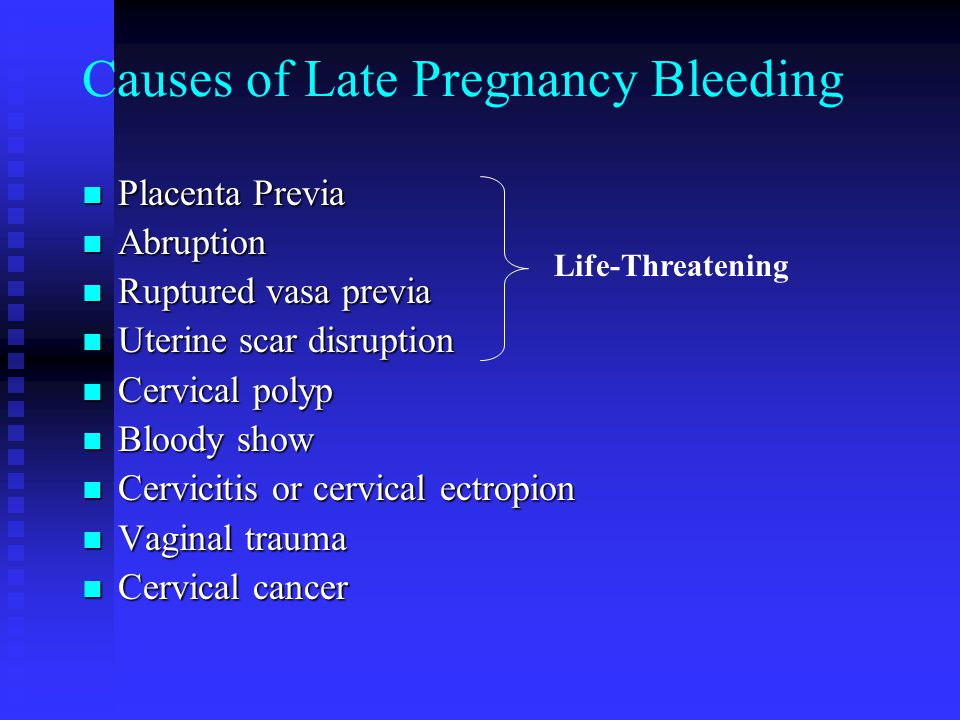
Symptoms of an ectopic pregnancy tend to develop in the 6th week of pregnancy but can happen later.
Other signs of ectopic pregnancy can include:
- tummy pain low down which may be on one side
- vaginal bleeding or a brown, watery discharge
- pain in the tip of your shoulder
- discomfort when peeing or pooing
Call 111 if you have symptoms of an ectopic pregnancy.
Causes of bleeding in later pregnancy
Cervical changes
These can lead to bleeding, particularly after sex.
Vaginal infections
Your midwife or doctor can discuss tests and treatment with you.
A 'show'
This is when the plug of mucus that has been in the cervix during pregnancy comes away, signalling that the cervix is getting ready for labour to start.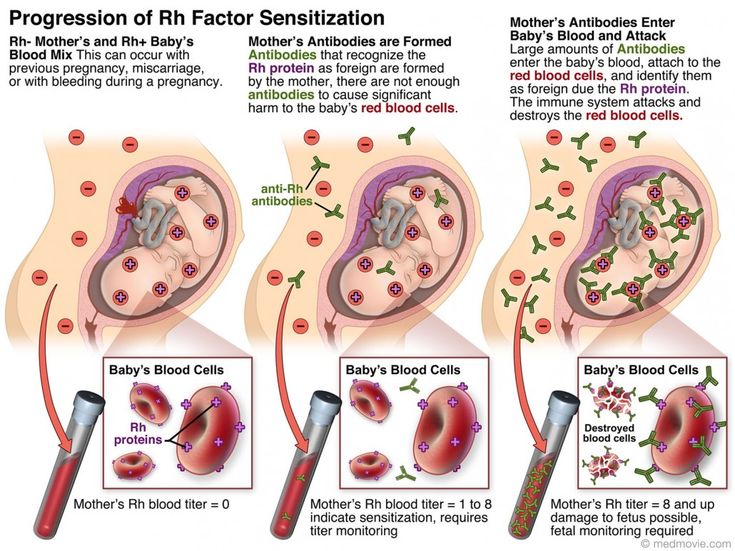 It may happen a few days before contractions start or during labour itself.
It may happen a few days before contractions start or during labour itself.
Find out about the signs of labour and what happens in labour.
Placental abruption
This is a serious condition in which the placenta starts to come away from the womb wall. Placental abruption usually causes stomach pain, and this may occur even if there is no bleeding.
Low-lying placenta (placenta praevia)
This is when the placenta is attached in the lower part of the womb, near to or covering the cervix. Bleeding from a low-lying placenta can be very heavy, and put you and your baby at risk.
You may be advised to go into hospital for emergency treatment, and a caesarean section will usually be recommended. The Royal College of Obstetricians and Gynaecologists has more information on placenta praevia.
Vasa praevia
This is a rare condition where the baby's blood vessels run through the membranes covering the cervix.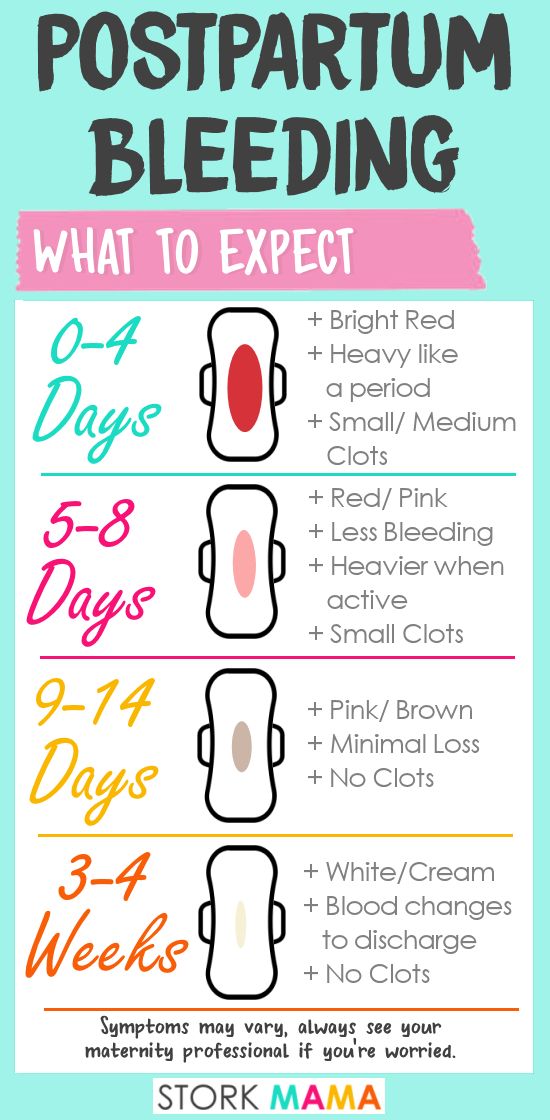
When your waters break, these vessels may be torn and cause vaginal bleeding. The baby can lose a life-threatening amount of blood.
Finding out the cause of bleeding in pregnancy
To work out what is causing the bleeding, you may need to have a vaginal or pelvic examination, an ultrasound scan or blood tests to check your hormone levels.
Your doctor will also ask you about other symptoms, such as cramp, pain and dizziness. Sometimes it might not be possible to find out what caused the bleeding.
If your symptoms are not severe and your baby is not due for a while, you'll be monitored and, in some cases, kept in hospital for observation.
How long you need to stay in hospital depends on the cause of the bleeding and how many weeks pregnant you are.
Being in hospital allows staff to keep an eye on you and your baby, so they can act quickly if there are further problems.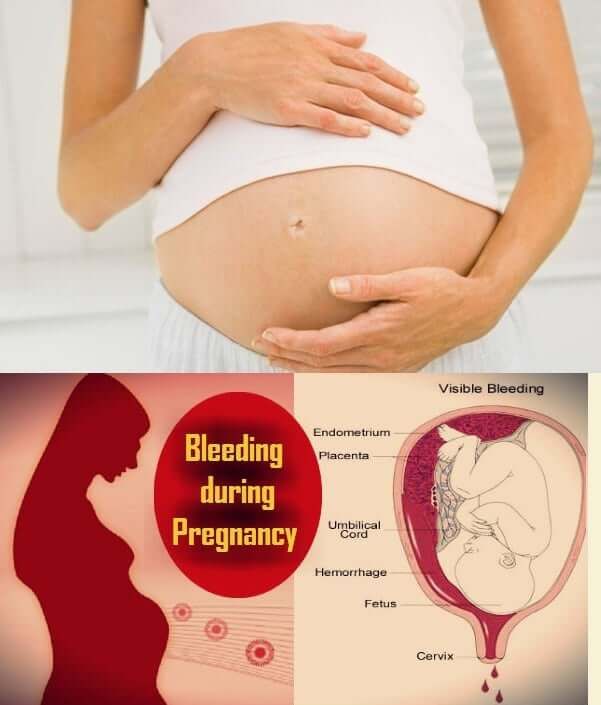
Find the answers to common health problems in pregnancy
Video: What should I do if I start bleeding during early pregnancy?
In this video, a midwife tells you what to do if you start to bleed during early pregnancy.
Media last reviewed: 20 March 2020
Media review due: 20 March 2023
Bloody discharge during pregnancy ᐈ Blood during early pregnancy
Seeing bloody discharge, a pregnant woman is always frightened. They are considered a symptom of miscarriage and other equally serious pathologies. At the same time, in some cases, the appearance of a small amount of blood is considered the norm and does not pose a threat to the life and health of the fetus or the expectant mother.
In early pregnancy, bloody discharge occurs in 25% of women. In most cases, they are associated with the implantation of the fetal egg to the wall of the uterus. Also, scanty spotting may appear on the dates of the expected menstruation.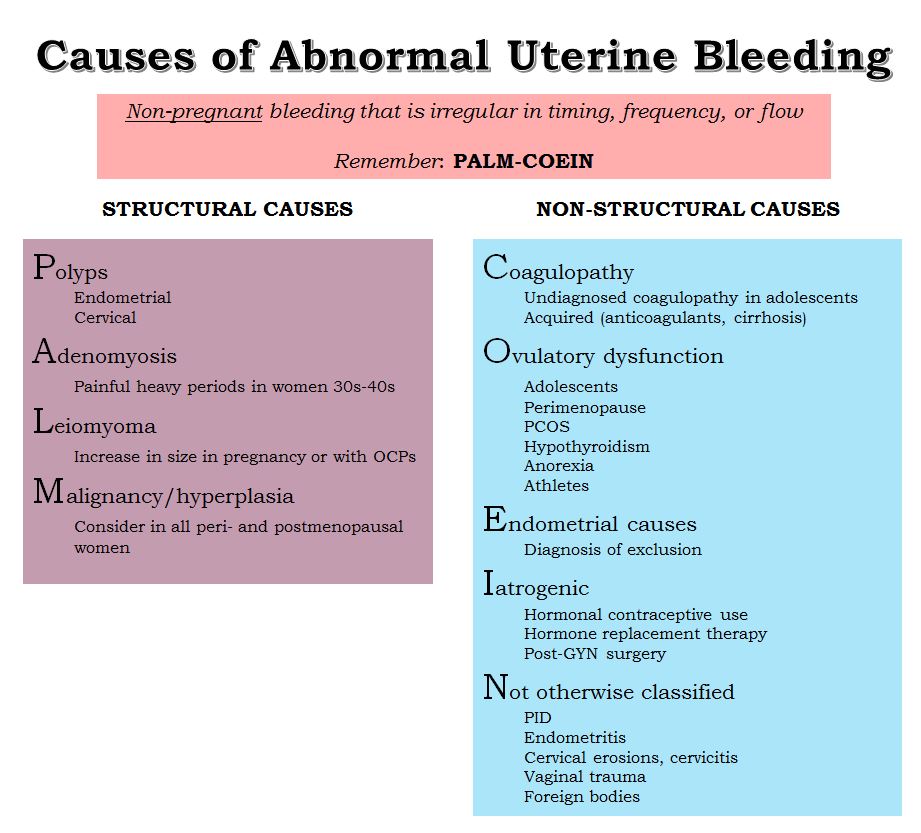 If they end quickly, are not accompanied by pain, and the woman has not had miscarriages or pregnancy complications before, most likely she has nothing to worry about. However, it is necessary to consult an obstetrician-gynecologist and undergo an examination.
If they end quickly, are not accompanied by pain, and the woman has not had miscarriages or pregnancy complications before, most likely she has nothing to worry about. However, it is necessary to consult an obstetrician-gynecologist and undergo an examination.
Why bloody discharge can appear and when it is dangerous, said Elena Petrovna Domnich, obstetrician-gynecologist of the highest category, gynecologist-endocrinologist, ultrasound specialist of the ADONIS medical center.
Elena Nikolaevna, tell me, can a woman have periods during pregnancy?
- Sometimes during pregnancy, a woman may experience spotting, but this should not be interpreted as menstruation. Menstruation occurs at the end of the menstrual cycle, during which the endometrium changes, first proliferative, then secretory. During the cycle, the endometrium prepares for pregnancy, and if it does not occur, then menstruation begins.
In the event of pregnancy, menstruation is not possible, although bleeding may occur at the expected time.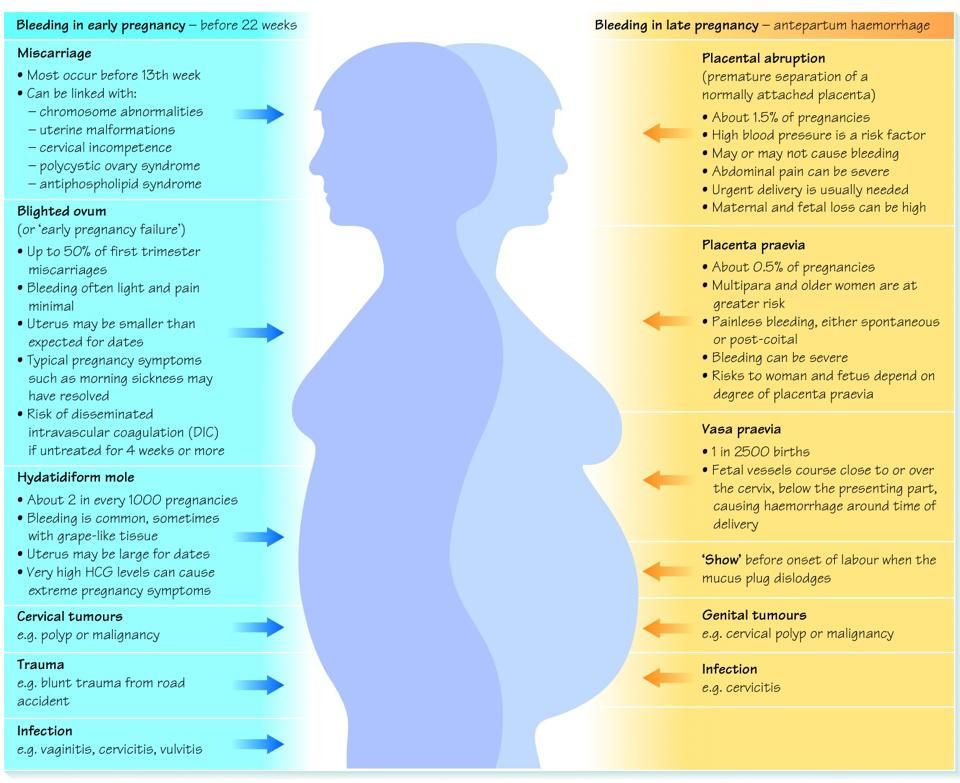 Because of this, some women do not immediately know that they are pregnant. However, when the obstetrician-gynecologist at the reception asks them about the nature of the discharge, it always turns out that they are different from menstrual. As a rule, they are more scarce, pass faster and are not accompanied by other symptoms. Sometimes a woman says that her period was very recent, but at the time of examination and examination, we find that she is already 8 or 12 weeks pregnant.
Because of this, some women do not immediately know that they are pregnant. However, when the obstetrician-gynecologist at the reception asks them about the nature of the discharge, it always turns out that they are different from menstrual. As a rule, they are more scarce, pass faster and are not accompanied by other symptoms. Sometimes a woman says that her period was very recent, but at the time of examination and examination, we find that she is already 8 or 12 weeks pregnant.
How often does this happen? Is spotting during pregnancy an exception or a fairly common occurrence?
- Bloody discharge is not common in pregnant women, but still it cannot be said that these are exceptional cases.
Tell me, if a woman is planning to conceive a child, and during the expected period she has atypical discharge, should she take a pregnancy test?
– Yes, but it is better to visit an obstetrician-gynecologist.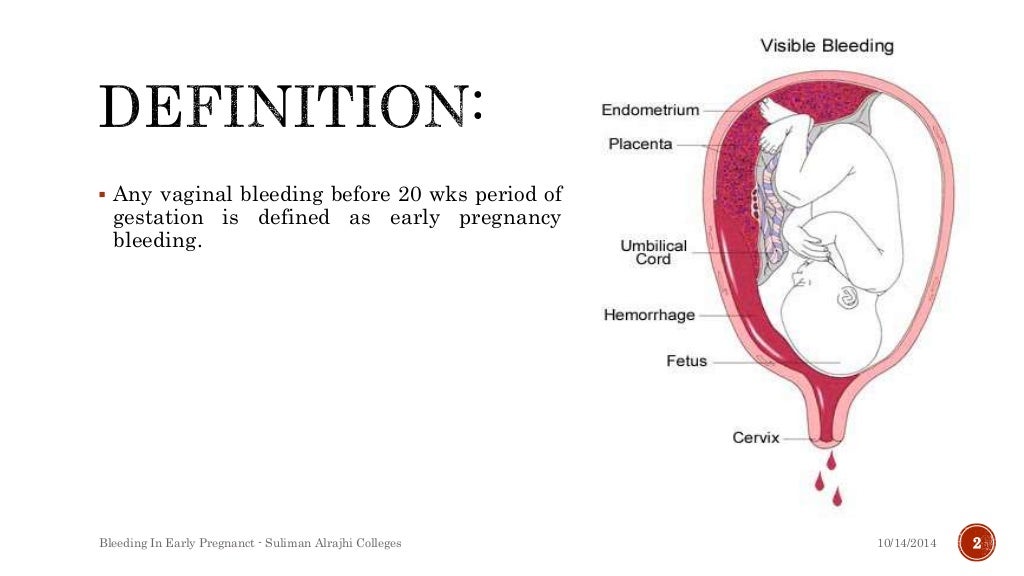 There are cases when a woman is pregnant, but the test strip shows a negative result. To accurately determine whether there is a pregnancy, allows a blood test for the level of hCG.
There are cases when a woman is pregnant, but the test strip shows a negative result. To accurately determine whether there is a pregnancy, allows a blood test for the level of hCG.
So bleeding during pregnancy is not menstruation, but bleeding? Why can it appear and why is it dangerous?
- Yes, that's right. This is bleeding, not menstruation. It can be a symptom of a miscarriage, ectopic pregnancy, or other pathology. For diagnosis, you must consult a doctor.
Tell me more, if a woman has a discharge and thinks she is menstruating, but a previous pregnancy test came back positive, could it be wrong?
- A pregnancy test is sometimes positive even if it is not. This happens if a woman has formed luteal cysts or developed a thyroid disease.
Bloody discharge during pregnancy requires contacting the antenatal clinic or the medical center where the woman was registered for pregnancy management.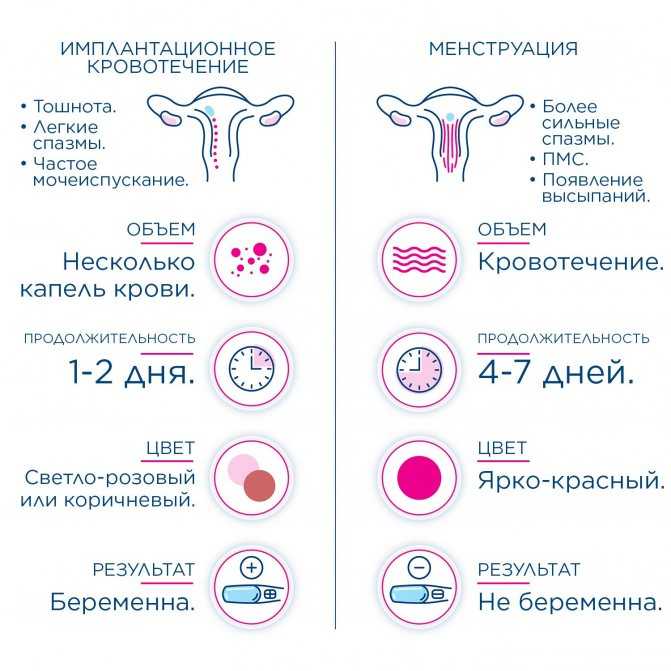 Sometimes they may not be dangerous, but without diagnosis, it cannot be ruled out that this is a symptom of a serious disorder.
Sometimes they may not be dangerous, but without diagnosis, it cannot be ruled out that this is a symptom of a serious disorder.
Bleeding may occur with:
- threatened miscarriage;
- ectopic pregnancy;
- infectious diseases of the reproductive system;
- cysts;
- myomas;
- cervical erosion;
- placental abruption;
- threatened preterm birth.
You can watch the video version of Elena Petrovna Domnich's interview here. More helpful videos on our YouTube channel.
What is it? Normal and abnormal discharge during pregnancy
Today we will talk with Elena Yurievna Romanova, an obstetrician-gynecologist at the Expert Center for Pregnancy Management at the Mother and Child Clinic, about what discharges during pregnancy should be feared and what discharges from the genital tract are regarded as normal.
Increased vaginal discharge during pregnancy is natural
Normal pregnancy discharge is milky white or clear mucus without a strong odor (although the smell may change from before pregnancy), this discharge does not irritate the skin and does not cause discomfort to the pregnant woman.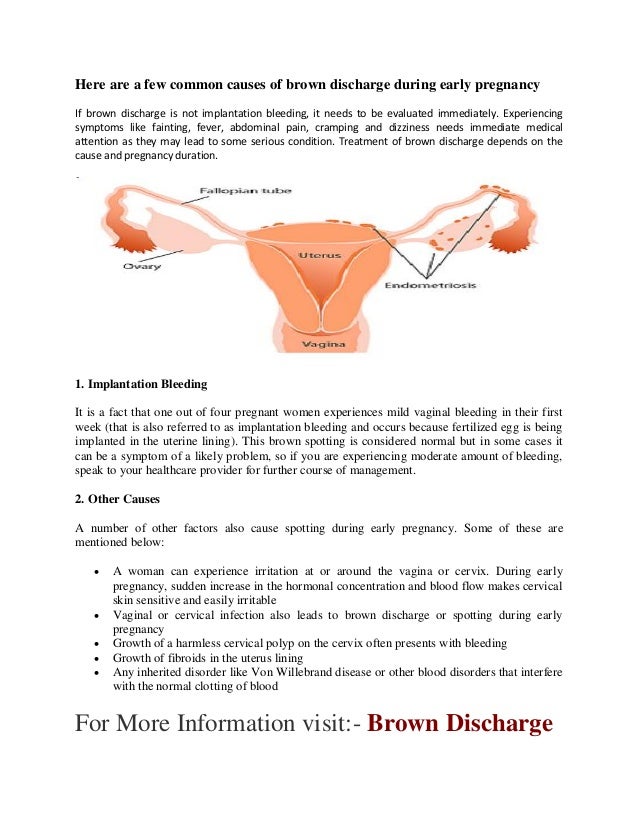 The discharge can have a different color - from completely colorless (most often) to whitish and yellowish. The consistency of discharge at the beginning of pregnancy resembles raw chicken yolk - they are thick, jelly-like, often released in the form of clots.
The discharge can have a different color - from completely colorless (most often) to whitish and yellowish. The consistency of discharge at the beginning of pregnancy resembles raw chicken yolk - they are thick, jelly-like, often released in the form of clots.
With normal discharge, it is enough to use panty liners or change underwear twice a day.
Due to the activity of progesterone in the first 12 weeks of pregnancy, the discharge will be scarce and viscous.
Due to the increase in estrogen activity from 13 weeks, the discharge becomes less viscous and more abundant.
By the end of the pregnancy, vaginal discharge becomes more and more abundant. Each time you need to evaluate the nature of the discharge, change the gasket. If the fluid continues to ooze, this may mean leakage of amniotic fluid and the need to contact an obstetrician-gynecologist in the emergency department of a hospital with a maternity ward. There are auxiliary tests, thanks to which, as well as obstetric ultrasound, leakage of water can be excluded.
Not all discharge in pregnant women is the norm.
For example, a white, thick, crumbly, odorless discharge that itchs and burns the skin and causes discomfort during intercourse is likely a sign of a yeast infection (candidiasis).
White or grayish discharge, the smell of which after sex begins to resemble the smell of fish, is the main symptom of bacterial vaginosis, vaginal dysbacteriosis.
A yellowish or greenish discharge that has a strong unpleasant odor usually occurs with nonspecific vaginitis, and a foamy discharge is a sign of trichomoniasis, a sexually transmitted disease.
In all these cases, contact your doctor immediately. It should not be treated with over-the-counter drugs and folk remedies. According to some external signs, a diagnosis cannot even be made by a doctor, in addition, infections in pregnant women should be treated especially carefully and only by a professional. After proper treatment, the discharge returns to normal. There is no need to get rid of the usual discharge for pregnant women. After childbirth, they will stop naturally, and before that they are a sign of the normal course of pregnancy.
There is no need to get rid of the usual discharge for pregnant women. After childbirth, they will stop naturally, and before that they are a sign of the normal course of pregnancy.
Allocations can change their nature and amount under the influence of irritants or intolerance to a particular substance, for example, when using panty liners. Such secretions are transparent and abundant, they stop when the irritant is removed.
"Thrush" is a disease caused by fungi of the genus Candida, present in small quantities in all women. During pregnancy, immunity decreases and fungi begin to actively multiply, causing inflammation, abundant white flocculent discharge with a sour smell, burning and itching in the vulva. The disease can manifest itself throughout pregnancy.
Bloody discharge in the first half of pregnancy usually indicates a lack of the hormone progesterone, which can lead to spontaneous miscarriage. Discharge may be accompanied by pain in the lower abdomen and lower back.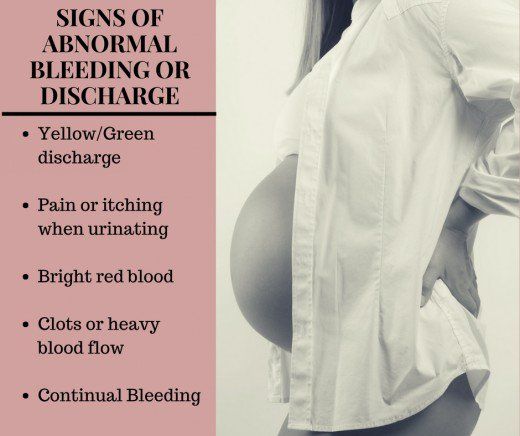 In the treatment of the threat of abortion, the appointment of progesterone drugs, such phenomena disappear.
In the treatment of the threat of abortion, the appointment of progesterone drugs, such phenomena disappear.
If bleeding from the vagina appeared during pregnancy during the second or third trimester, then this is a sign of a formidable complication, namely, placenta previa or its premature detachment. With improper attachment of the placenta in the uterine cavity and overlapping of the placental tissue with the area of the internal pharynx, they speak of placenta previa. In this case, spotting occurs in a third of pregnant women. This most often occurs between 28 and 30 weeks, when the lower segment of the uterus is most prone to stretching and thinning. The discharge is repeated, the woman does not experience any pain, so it may be too late to see a doctor for an examination. This threatens the child with a lack of nutrients and oxygen, because it is through the placenta that the fetus is nourished. For a pregnant woman, this is fraught with acute placental abruption and severe bleeding, which is always problematic to stop, especially at home.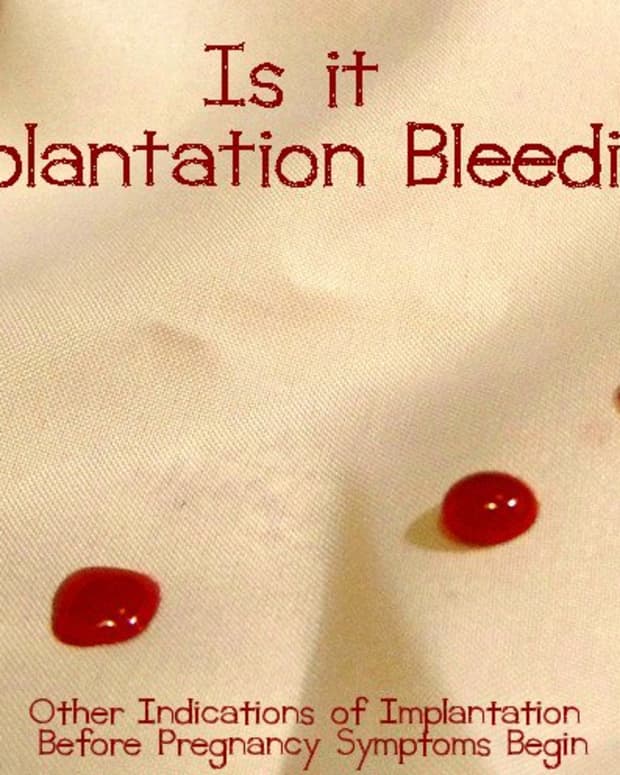
Bloody discharge during pregnancy should force a woman to immediately contact her obstetrician-gynecologist.
Brown discharge during pregnancy also indicates the threat of termination of pregnancy, or bleeding "erosion" (decidual polyp) of the cervix. Therefore, you should not understand these issues on your own; when brown discharge appears, it is better to consult your doctor.
Brown discharge during a delay in menstruation as a sign of an ectopic pregnancy is very dangerous. This condition requires immediate surgical care, as the growing embryo can rupture the wall of the fallopian tube at any time and cause internal bleeding. Therefore, with pain in the lower abdomen, which is accompanied by brown discharge from the genital tract and delayed menstruation, you should immediately call an ambulance.
When the vagina becomes inflamed, the mucous discharge acquires a mucopurulent character, a greenish-yellow color, an unpleasant odor, burning and itching appear in the genital area. This is how chlamydia, mycoplasmosis, ureaplasmosis, trichomoniasis manifest themselves. Is it necessary to treat the infection during pregnancy, or is it better to do it after childbirth?
This is how chlamydia, mycoplasmosis, ureaplasmosis, trichomoniasis manifest themselves. Is it necessary to treat the infection during pregnancy, or is it better to do it after childbirth?
All sexually transmitted infections in pregnant women require treatment, as they can pass to the fetus and cause intrauterine infection (IUI). IUI is very dangerous for a child - it leads to his death or serious illness. Infection of a child during childbirth can lead to such serious complications as pneumonia, severe damage to the brain, kidneys, liver, and blood poisoning (sepsis).
Today, obstetricians and gynecologists have learned to treat any infection in pregnant women in accordance with special guidelines for the timing of pregnancy, so that it is effective and safe for mother and fetus. It is not the treatment that should be feared, but the infection itself and its consequences.
Medicines that are used to treat pregnant women have passed the necessary clinical trials, during which it was proved that they do not have a negative effect on the pregnant woman and the fetus, including that they do not have a teratogenic effect (do not cause deformities in the fetus).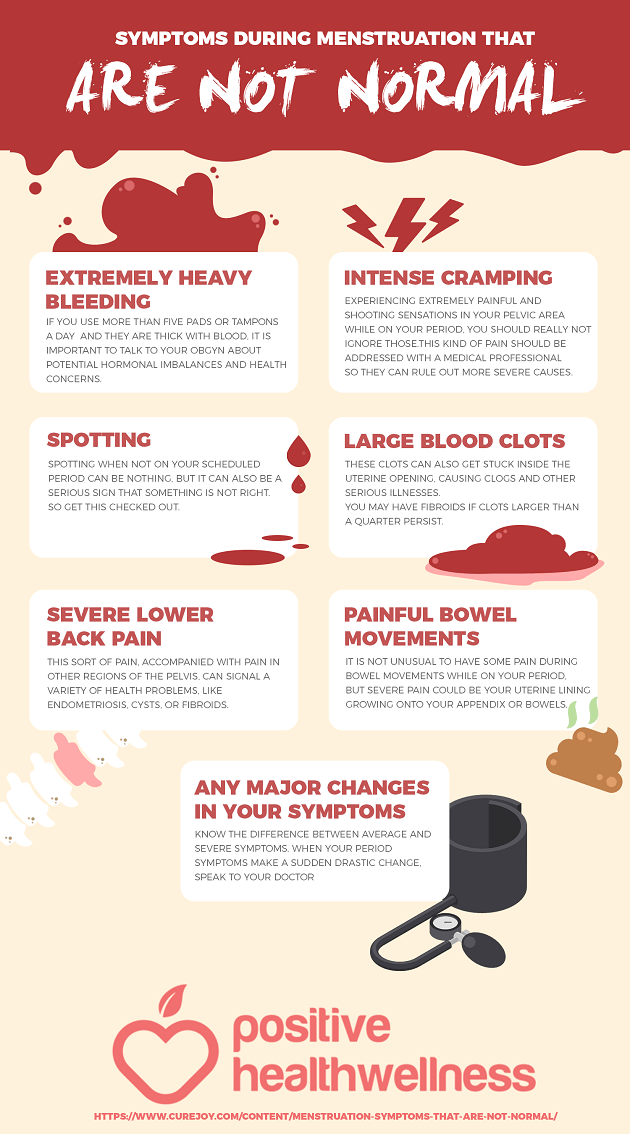
Sometimes the discharge is mucous in nature, occurs upon contact with an irritant or allergen. It can be synthetic tight underwear, allergies to fabrics, toiletries, personal care products. If irritation and allergens are not eliminated in time, then an infection that lives on the mucous membranes of the genital organs will definitely join.
Hygiene measures are mandatory for pregnant women. Twice a day you need to take a warm shower, using special gels for pregnant women to wash the genitals. Be sure to monitor the cleanliness of the whole body and underwear - it must be changed daily. Pads (but not tampons!) can be used for discharge. The oral cavity can become the source of infection, so you need to monitor your teeth, brush them twice a day and get an examination by a dentist. Good nutrition strengthens the immunity of a pregnant woman. The diet should contain fresh vegetables and fruits, lean meats and fish, daily dairy products, vegetable oil, a variety of cereals.